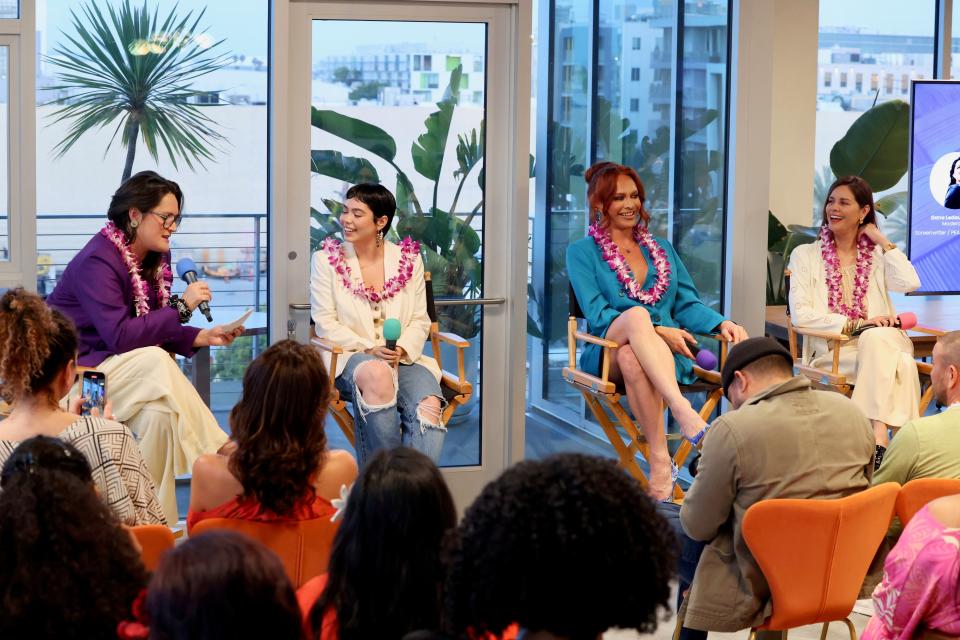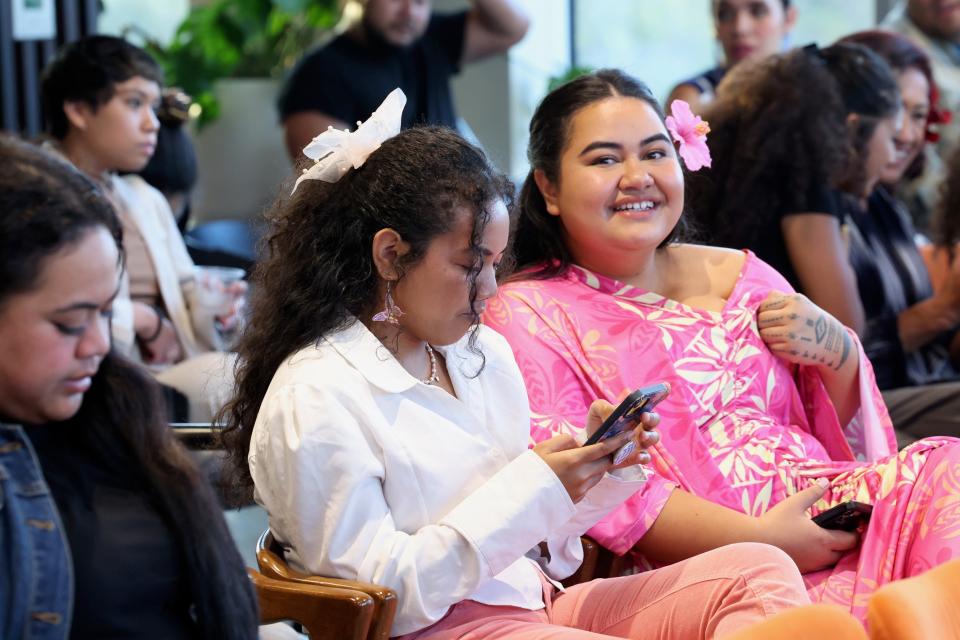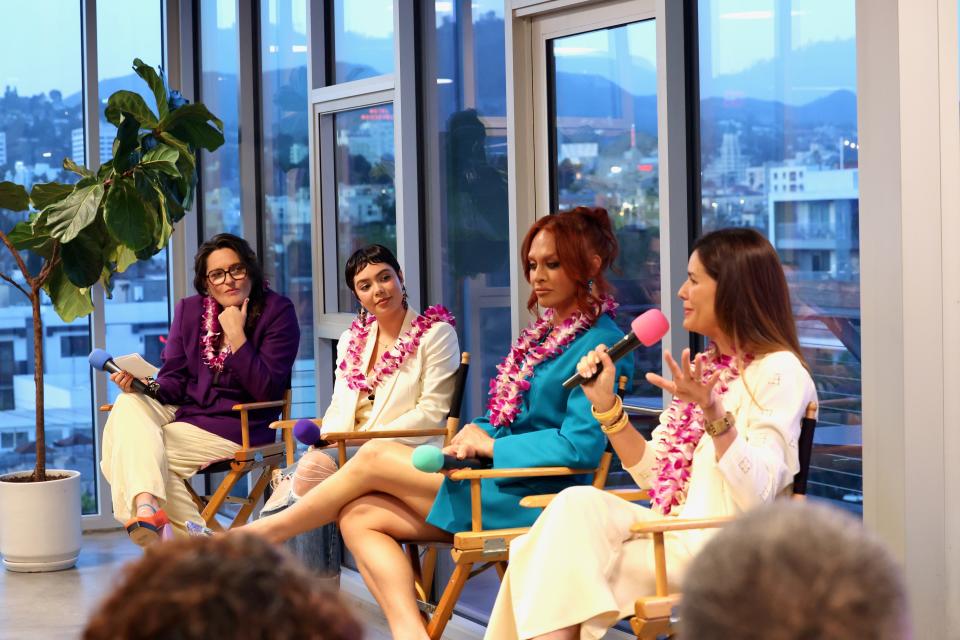Auli'i Cravalho Is Eager to Usher in Next Moana & Increase Pasifika Representation

Robin L. Marshall
When most people think about Pasifika representation in Hollywood (if they ever do), very few celebrities come to mind, aside from notable stars like Dwayne “The Rock” Johnson or Jason Momoa. Representation is very few and far between for Pacific Islanders, and particularly with women in the industry. That’s the reason why the Pasifika Entertainment Advancement Komiti, or PEAK, kicked off AAPI Heritage Month celebrating Pasifika women in entertainment.
The organization, whose mission is to “redefine and expand Pasifika entertainment” and inspire Pacific Islander creatives, kicked off AAPI Heritage Month with Mean Girls movie musical star Auli’i Cravalho, RuPaul’s Drag Race winner Sasha Colby, and producer Naomi Scott for a panel discussion moderated by live-action Moana screenwriter and PEAK co-founder Dana Ledeoux Miller. “These women have shaped the industry in their own ways,” Cravalho tells Teen Vogue. “I'm excited for everyone to be able to ask us things that they've thought to themselves. This is an open space. Hopefully I can answer as many questions as I can and work with as many people in this room as possible in the future.”

Prior to the panel discussion, Teen Vogue spoke with the panelists, who shared more about their experiences as women in the industry and how they navigate the space, while also touching on issues they believe should be addressed, particularly with representation.
“I think as a Pasifika trans woman, when I look for representation, unfortunately in media and in entertainment, the representation that I would gravitate to is just a broad umbrella of a POC trans person,” says Sasha Colby, who is of Native Hawaiian descent. “And when we really get down to being Pasifika, there is a level of grouping us all together. [We’ve always] celebrated our individuality and where we come from, all these little islands, all these little communities, these little systems that have worked for eons. For us to not have that shown is the biggest detriment because then we are not a whole person. It's just kind of a shell. And then we're just used for the token Pasifika person.”
While the lack of representation is a prevalent issue, Naomi Scott says the first step in combating the issue is simply education. “A lot of people will have a real blank stare when I say I'm Pacific Islander, and I think that's sad. This is part of our national history, really, whether or not it's a positive one or complex one,” says the producer, who is of CHamoru descent. “I think educating people on the basic facts that my family is from Guam. So just even understanding where Guam physically is. I grew up telling people, unfortunately, that I was from Hawaii because I thought that's easier. So I think overcoming the challenges, even what a Pacific Islander is, is tantamount to overcoming the representation issue.”

Beyond representation, there’s also the complexity of staying close to your cultural roots while working in a predominantly Western industry. “My identity is so rooted to Hawaii, and I have always known myself as a Hawaiian, as a Pacific Islander,” Cravalho says. “And who am I when I leave Hawaii? How do I represent myself when I'm so far from home? Thankfully, I have this incredible platform.” And with that platform, Cravalho also immerses herself in advocacy, working with the UN for small island developing states like the Marshall Islands, the Solomon Islands — places that in the next 30 to 50 years could be underwater.
“Discussing solutions, talking with individuals of family offices who can lend their support–these relationships, I realize, ground me in what is real. So as much as I love playing pretend, and as much as I enjoy making films and things, I sometimes feel like I'm not doing anything tangible,” Cravalho tells Teen Vogue. “Being able to speak with people who are making decisions on behalf of their entire communities or their entire country, and using my platform to amplify their experiences and to amplify their voices, that helps ground me again in the true work, which is again, amplifying Pacific voices. “I think I've realized that is what I'm here for. Because if I can't work on my own projects, then I want to help work on other people's projects.”

While there’s still a long way to go for Pasifika women in the industry, the panelists shared their hopes for the community within the next five years. “More, more, more, more!” Auli'i Cravalho says. “It's part of the reason I'm so excited for [the Moana] live action. I'm not reprising my role because I'm happy to pass that baton on to the next young woman of Pacific Island descent. I look forward to ushering her into this. I've been to so many AAPI events where there's a lot of Asian Americans, not so many Pacific Islanders. And it gets lonely when I'm the only one che-hooing on here.”
Echoing Cravalho, Scott and Colby also hope Pasifika storytelling expands. “I want the highs and the lows, the bright moments and the dark moments, who we are, we're multifaceted,” Scott says. “And I think that is the goal, rather than just check[ing] a box.”
“There's a whole well of untapped stories in our own culture that's literally in our history that would be so beautifully told,” says Colby. “[Also] portraying us in a different light rather than just the stereotypical, the characterization of qualities: happy, passive, usually sexualized, especially the women. For us to have depth and power and really tell our stories, would give us a lot of power and strength and would make people really more interested in us. The more I talk about Hawaiian culture and the history of Hawaii, everyone's like, ‘we did not know this.’ And I think that's the thing. Keep telling stories and that's what we as Pasifika [people] really do well — we hold onto our stories.”
Originally Appeared on Teen Vogue
Want more great Culture stories from Teen Vogue? Check these out:
A New Generation of Pretty Little Liars Takes on the Horrors of Being a Teenage Girl
Underneath Chappell Roan’s Hannah Montana Wig? A Pop Star for the Ages
Donald Glover’s Swarm Is Another Piece of Fandom Media That Dehumanizes Black Women
On Velma, Mindy Kaling, and Whether Brown Girls Can Ever Like Ourselves on TV
Gaten Matarazzo Talks Spoilers, Dustin Henderson, and Growing Up on Stranger Things
How K-pop Stars Are Leading Mental Health Conversations for AAPI People and Beyond
Meet the Collective of Philly TikTokers Making You Shake Your Hips
The Midnight Club Star Ruth Codd Isn’t Defined By Her Disability


